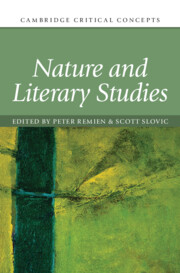Book contents
- Nature and Literary Studies
- Cambridge Critical Concepts
- Nature and Literary Studies
- Copyright page
- Dedication
- Contents
- Figures
- Contributors
- Acknowledgments
- Introduction
- Part I Origins
- Chapter 1 The Book of Nature
- Chapter 2 Pastoral
- Chapter 3 Wilderness
- Chapter 4 Lucretian Materialism
- Chapter 5 Natural Philosophy
- Chapter 6 Natural History
- Part II Development
- Part III Applications
- Further Reading
- Index
Chapter 3 - Wilderness
from Part I - Origins
Published online by Cambridge University Press: 22 July 2022
- Nature and Literary Studies
- Cambridge Critical Concepts
- Nature and Literary Studies
- Copyright page
- Dedication
- Contents
- Figures
- Contributors
- Acknowledgments
- Introduction
- Part I Origins
- Chapter 1 The Book of Nature
- Chapter 2 Pastoral
- Chapter 3 Wilderness
- Chapter 4 Lucretian Materialism
- Chapter 5 Natural Philosophy
- Chapter 6 Natural History
- Part II Development
- Part III Applications
- Further Reading
- Index
Summary
In “Wilderness,” Debbie Lee traces the conceptual origins of wilderness writing to the “wildēors” (self-willed land) of ancient and medieval texts like Beowulf and to Indigenous place-based language and storytelling such as that of the Nimiipuu. In addition to tracing a history of the “wilderness movement” of the nineteenth and twentieth centuries, through the writings of authors like Wordsworth, Thoreau, and Muir, Lee also suggests an alternative history of wilderness rooted in social and environmental justice and expressed in Black and Indigenous literatures. Using examples from the works of Barry Lopez, Evelyn White, Gary Snyder, Toni Morrison, and Cecil Giscombe, among many others, Lee demonstrates the diversity and range of wilderness literature, arguing that we should think of “wilderness movements” in the plural.
Keywords
- Type
- Chapter
- Information
- Nature and Literary Studies , pp. 65 - 86Publisher: Cambridge University PressPrint publication year: 2022

